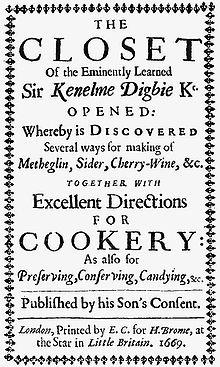The Closet of the Eminently Learned Sir Kenelme Digbie Kt. Opened
 |
|
| Author | Sir Kenelm Digby (attrib.) |
|---|---|
| Country | England |
| Subject | Cookery |
| Publisher | H. Brome |
|
Publication date
|
1669 |
| Pages | 251 |
The Closet of the Eminently Learned Sir Kenelme Digbie Kt. Opened, commonly known as The Closet Opened, is an English cookery book first printed in 1669. It is supposedly based upon the writings of Sir Kenelm Digby, being as the title page states "published by his son's consent".
The book gives recipes for traditional English dishes such as meat pies, pasties and syllabub, but also reflects on Digby's travels around Europe, with recipes such as "Pan Cotto, as the Cardinals use in Rome". The book echoes an earlier age with some hundred recipes for brewing mead and metheglin.
The book consists entirely of recipes, with no structured introduction. There are no illustrations. There is an alphabetical index at the end.
Digby makes use of ingredients including flowers, vegetables, meats, herbs, spices, alcohol, fruits and berries, eggs, milk, grains, and honey.
Foreign influence can be seen in recipes such as "Pan Cotto, as the Cardinals use in Rome", and "A savoury and nourishing boiled Capon, Del Conte di Trino, a Milano," which calls for costly ambergris, dates, raisins, currants and sugar; the bird is boiled inside an ox bladder.
Advice is given that diverges from the recipe headings onto related topics. In "Tea with Eggs", it is advised not to let tea soak too long in hot water "which makes it extract into itself the earthy parts of the herb", but "The water is to remain upon it no longer then whiles you can say the Miserere Psalm very leisurely... Thus you have only the spiritual parts of the Tea". Similarly under "Pan Cotto", the author gives general advice upon breakfasting, recommending "juyce of Orange", cream of oatmeal or barley, and ending "Two poched eggs with a few fine dry-fryed Collops of pure Bacon, are not bad for breakfast, or to begin a meal".
Instructions are given "to feed Chickens" and other poultry.
The Closet Opened begins with a section (pages 1 to 103) on brewing soft and alcoholic drinks. There are many recipes for mead and metheglin, and some for ale, cider, and wines from fruits including cherry and strawberry.
...
Wikipedia
